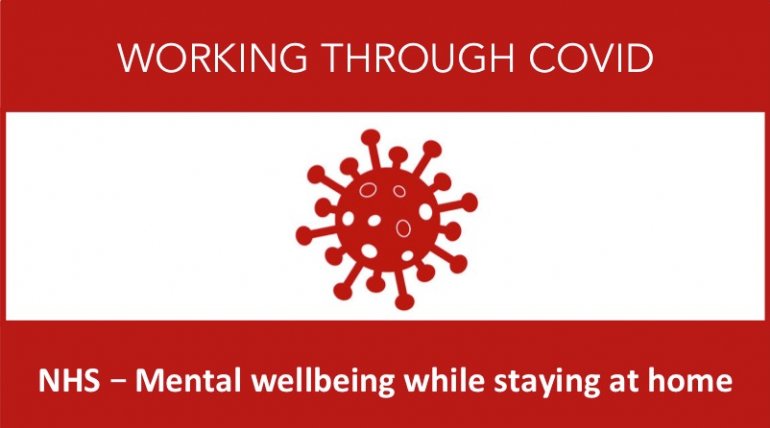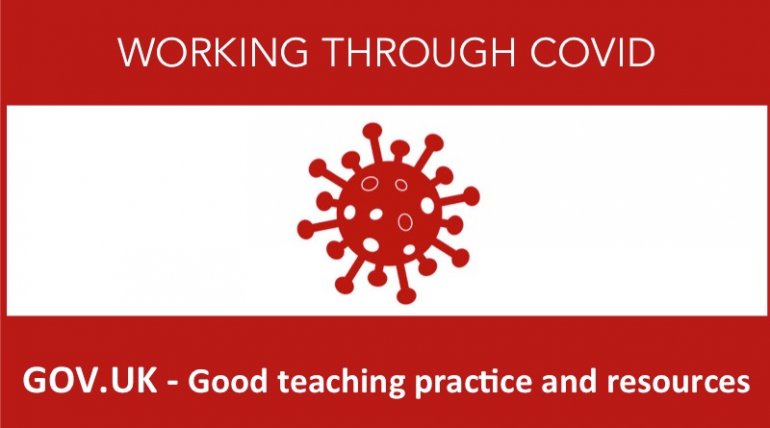NHS - Mental wellbeing while staying at home
Taking care of your mind as well as your body is really important if you are staying at home because of coronavirus(COVID-19).
You may feel worried or anxious about your finances, your health or those close to you. Perhaps you feel bored, frustrated or lonely. It's important to remember that it's OK to feel this way and that everyone reacts differently.
Remember, for most of us, these feelings will pass. Staying at home may be difficult, but you're helping to protect yourself and others by doing it.
There are things you can do now to help you keep on top of your mental wellbeing and cope with how you may feel if you're staying at home. Make sure you get further support if you feel you need it.
The government also has wider guidance on staying at home as a result of coronavirus.
1. Check your employment and benefits rights
You may be worried about work and money while you have to stay home – which can have a big effect on your mental health.
If you have not already, you might want to talk with your employer. Find out about government support for businesses and self-employed peopleand understand your sick pay and benefits rights.
Knowing the details about what the coronavirus outbreak means for you (England and Wales only)can reduce worry and help you feel more in control.
2. Plan practical things
If you're unable to get to the shops, work out how you can get any household supplies you need. You could try asking neighbours or family friends, or find a delivery service.
Continue accessing treatment and support for any existing physical or mental health problems where possible. Let services know you are staying at home, and discuss how to continue receiving support.
If you need regular medicine, you might be able to order repeat prescriptions by phone, or online via a website or app. Contact your GP and ask if they offer this. You can also ask your pharmacy about getting your medicine delivered, or ask someone else to collect it for you.
If you support or care for others, either in your home or by visiting them regularly, think about who can help out while you are staying at home. Let your local authority (England, Scotland and Wales only)know if you provide care or support someone you do not live with. Carers UK has further advice on creating a contingency plan.
3. Stay connected with others
Maintaining healthy relationships with people you trust is important for your mental wellbeing.
Think about ways to stay in touch with friends and family – by phone, messaging, video calls or social media.
4. Talk about your worries
It's normal to feel a bit worried, scared or helpless about the current situation. Remember: it is OK to share your concerns with others you trust – and doing so may help them too.
If you cannot speak to someone you know or if doing so has not helped, there are plenty of helplines you can try instead.
5. Look after your body
Our physical health has a big impact on how we feel. At times like these, it can be easy to fall into unhealthy patterns of behaviour that end up making you feel worse.
Try to eat healthy, well-balanced meals, drink enough water and exercise regularly. Avoid smoking, drugs or drinking too much alcohol.
If you are staying at home, you could try exercising indoors, as there are lots of free online classes. Or try an easy 10-minute home workout.
6. Stay on top of difficult feelings
Concern about the coronavirus outbreak and your health is normal. However, some people may experience intense anxiety that can affect their day-to-day life.
Try to focus on the things you can control, such as how you act, who you speak to and where you get information from.
It's fine to acknowledge that some things are outside of your control, but if constant thoughts about the situation are making you feel anxious or overwhelmed, try some ideas to help manage your anxiety.
7. Do not stay glued to the news
Try to limit the time you spend watching, reading or listening to coverage of the outbreak, including on social media, and think about turning off breaking-news alerts on your phone.
You could set yourself a specific time to read updates or limit yourself to checking a couple of times a day.
Use trustworthy sources – such as GOV.UKor the NHS website– and fact-check information from the news, social media or other people.
8. Carry on doing things you enjoy
If we are feeling worried, anxious, lonely or low, we may stop doing things we usually enjoy.
Make an effort to focus on your favourite hobby if it is something you can still do at home. Or start a new hobby: read, write, do crosswords or jigsaws, bake, or try drawing and painting. Whatever it is, find something that works for you.
If you cannot think of anything you like doing, try learning something new at home. There are lots of free tutorials and courses online.
You can still stay social at home by joining others online: book clubs, pub quizzes and music concerts are just a few of the things to try.
9. Take time to relax
This can help with difficult emotions and worries, and improve our wellbeing. Relaxation techniquescan also help deal with feelings of anxiety.
10. And get good sleep
Good-quality sleep makes a big difference to how we feel, so it's important to get enough.
Try to maintain your regular sleeping pattern and stick to good sleep practices.
Further support and advice
There are plenty of things you can do and places to get more help and support if you are struggling with your mental health. Our pages on stress, anxiety, sleepand low moodhave lots more tips and specific advice. If you are a parent or caregiver for a child or young person, Young Minds has guidance on talking to your child about coronavirus.
The NHS mental health and wellbeing advicepages also have a self-assessment, as well as audio guides and other tools you can use while staying at home.
We also have guidance and information to help othersif someone you know is struggling with their mental health.
Remember, it's quite common to experience short-lived physical symptoms when you are low or anxious. Some of these, like feeling hot or short of breath, could be confused with symptoms of coronavirus.
If this happens, try to distract yourself. When you feel less anxious, see if you still have the symptoms that worried you. If you're still concerned, visit the NHS website.
If you do not live in England
Additional country-specific coronavirus guidance is available for Scotland,Walesand Northern Ireland.
Follow this link for more NHS guidance and advice.








_770x428.jpg?reload=2024-04-22 15:33:17)










